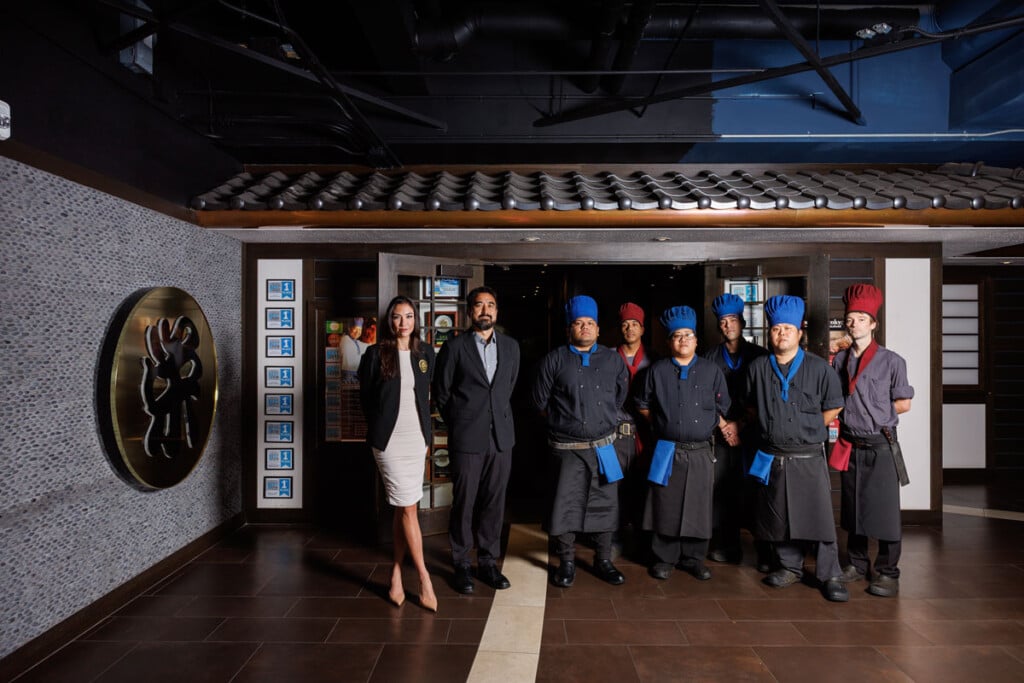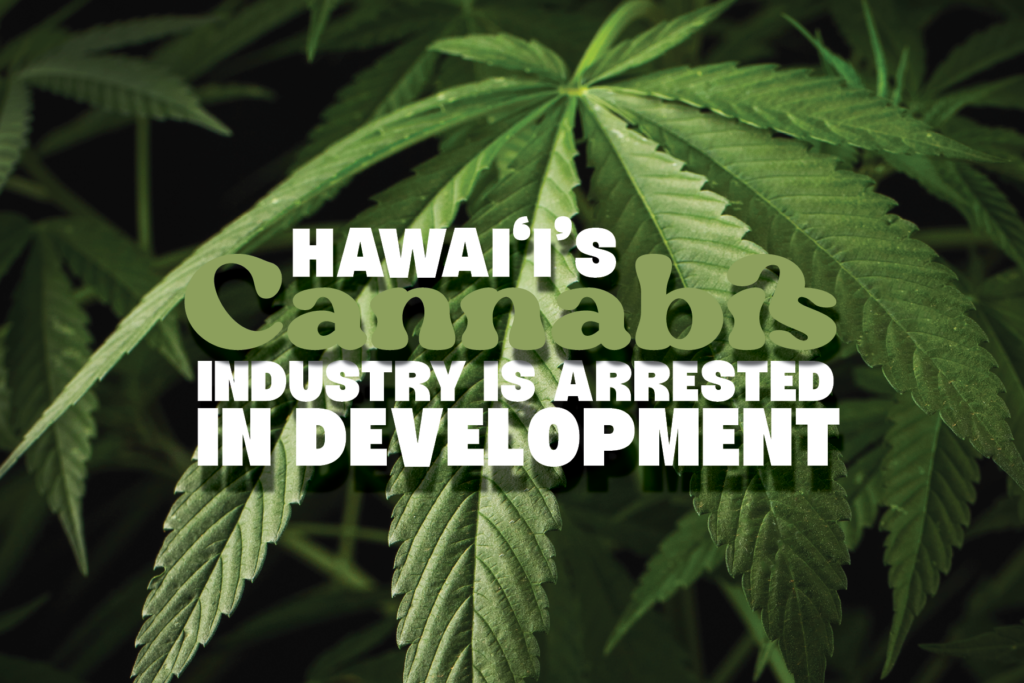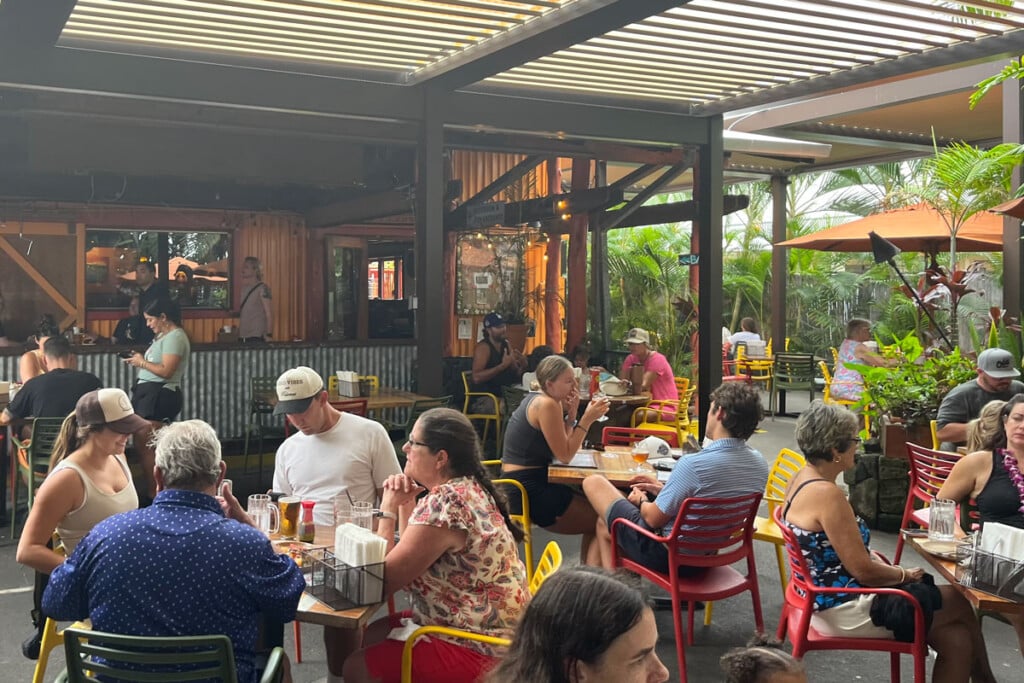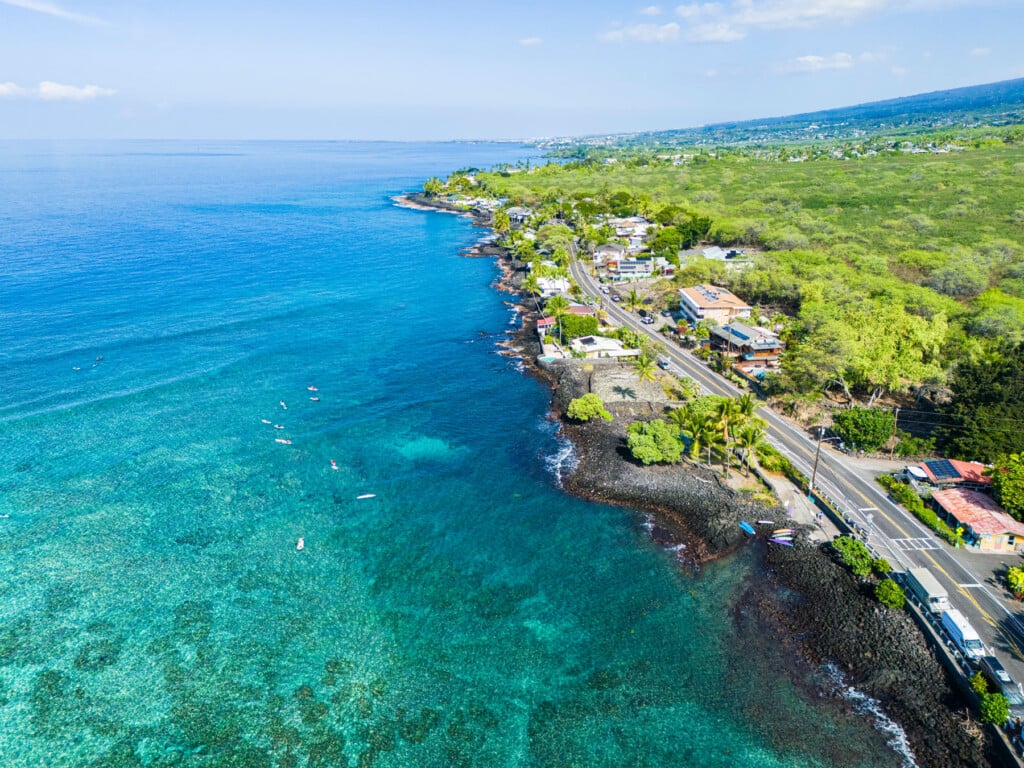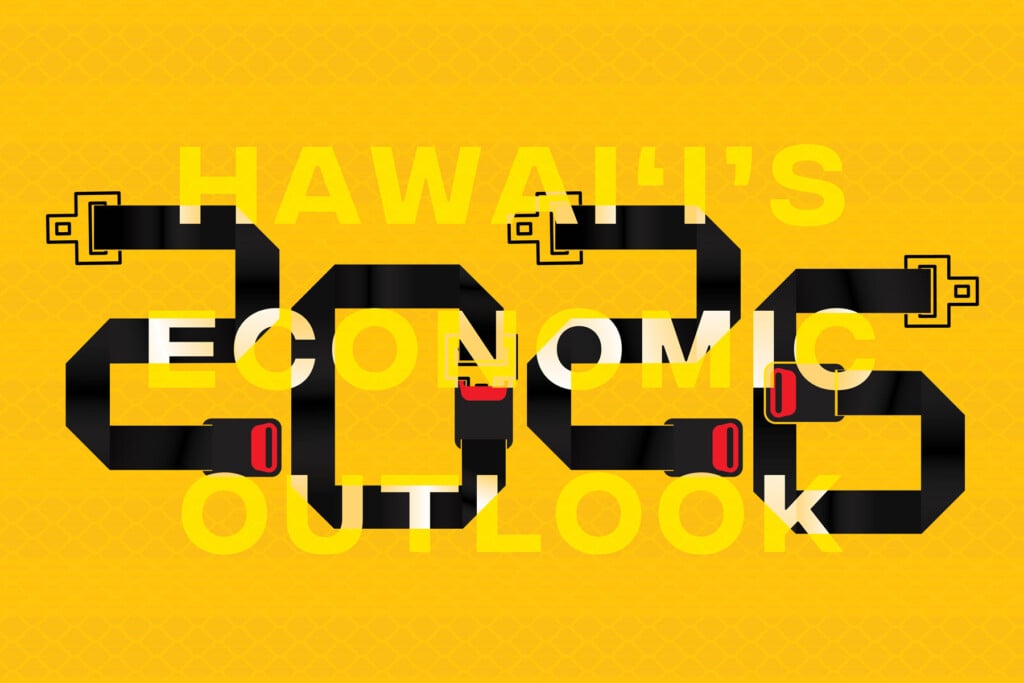Peter Ho, CEO of Bank of Hawai‘i
"It is the best job in the world," Ho says about his role as CEO of Bank of Hawai‘i. In a far-ranging interview, he told Hawaii Business about his thoughts on the growth trajectory of Hawai‘i's economy, the future of Bank of Hawai‘i and the role of technology and AI.
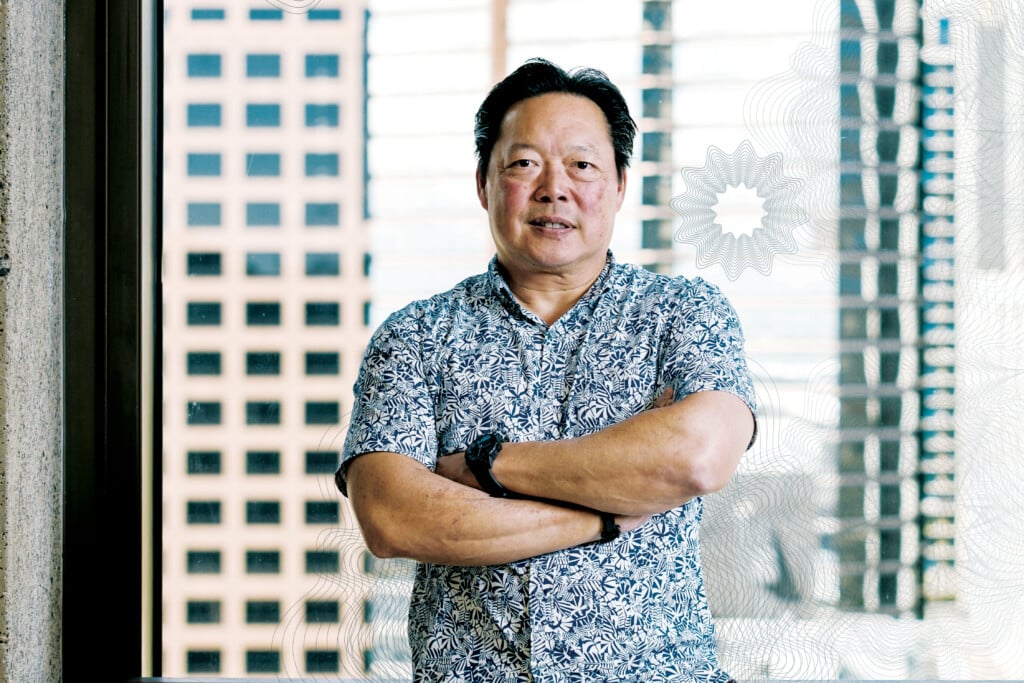
Peter Ho, CEO of Bank of Hawai‘i, moved out of his posh 22nd-floor suite – about the size of a New York City apartment – and down one floor to help set the tone for his leadership.
At the time, the company was shifting employees to a new open floor plan, and Ho believed it was important for executives to model the change.
“It made more sense to be with the team,” he told me as we walked through the airy open space, lined with floor-to-ceiling glass that looks out over downtown Honolulu and the Pacific Ocean.
It was a powerful gesture – one that speaks volumes about how Ho views leadership: not from above, but from within. For him, leading means putting others first, a philosophy that has shaped Bank of Hawai‘i’s culture and earned him loyalty within the organization.
After nearly three decades covering Wall Street, I couldn’t help but think of Jamie Dimon, the longtime CEO of JPMorgan Chase, who similarly embraces humility, hard work and listening as core leadership values.
“I’ve enjoyed every second of it,” Ho said. “It is the best job – maybe in the world, but certainly in this town, to me. But ultimately, what’s really meaningful is making a difference for our employees, for the community.”
That mindset is echoed by Donna Ramirez, Ho’s executive assistant, who has worked alongside him for more than three decades.
“Peter sets the bar high and he’s tough when it counts,” she said, “but he’s also shown me what it looks like to lead with heart. He genuinely cares about people and the community. I’ve been blessed to know and work for him for 30-plus years.”
Under Ho’s leadership, Bank of Hawai‘i has become a nationally respected financial institution. In 2024, the bank cracked the $1 billion mark in annual revenue – a milestone reflecting sustained growth.
Time magazine recently named it one of America’s Best Midsize Companies of 2025. The bank has also landed on Forbes’ list of America’s Best Banks for 15 consecutive years and earned a spot on Newsweek’s Most Trustworthy Companies in Banking – the only Hawai‘i-based company on the list.
Ho was named president of Bank of Hawai‘i in 2008 and added the titles of chairman and CEO in 2010. In July 2024, James C. Polk was promoted to president, while Ho retained the dual roles of chairman and CEO. A board member since 2005, Ho began his banking career in 1987 with Manufacturers Hanover in New York City.
COMMITTED PHILANTHROPIST
Ho’s influence extends far beyond the walls of the bank.
A committed philanthropist, he serves as chair of the Hawai‘i Community Foundation’s Board of Governors, a role he’s held since 2019 after joining the board more than a decade earlier. He and his wife, Michelle, also established the Peter & Michelle Ho Family Foundation Fund, which supports essential services across the state – from basic needs to health and human services – guided by Maslow’s Hierarchy of Needs and a belief in helping underserved communities through sustainable, high-impact initiatives.
He’s a regular contributor to the Hawai‘i Community Foundation’s Catalyst Fund, an unrestricted resource that enables the organization to fund innovation, research and operational needs. His giving philosophy reflects his approach to leadership: support the infrastructure, trust the process and empower people to do meaningful work.
In 2021, Ho joined the Board of Trustees of Punahou School, his alma mater, and he also serves on the boards of several other key institutions, including the Hawaii Business Roundtable and various nonprofits committed to strengthening the local community.
A DEPARTURE FROM GLOBALIZATION
The following is a condensed version of a two-hour conversation I had with Ho at the bank’s downtown Honolulu headquarters.
HB: Given the persistent tariff wars and global uncertainty, what keeps you up at night and worries you the most?
PH: I think that there are a ton of countervailing currents happening at the global, national and local level that are creating all sorts of challenges and all sorts of mischief – a redirection of trends that are really difficult to get your arms around.
Let’s talk about Trump’s agenda, which is basically a departure from globalization – and a kind of rewiring back to a very domestic agenda. That is a complete shift from the past 20 to 40 years.
I’m not making a judgment. That might be the right call today, but whether it is or is not, that is an abrupt shift. When things that big and that far-reaching shift like that – abruptly – there are oftentimes dislocations and unintended consequences. It’s really difficult to see what’s coming.
HB: Is this a black swan event?
PH: I don’t know if it’s a black swan event, although there have been a lot of black swan events in the 21st century.
Anytime you break things that have been a consistent pattern for decades, there’s the opportunity for a lot of mischief. Your logic train has been built on the last 20 years, 30 years for corporate leaders, for community leaders, for everybody.
What keeps me up at night is the fact that there is a lot of change happening right now.
AI is a dramatic, technological, operational shift that’s happening in front of our very eyes. As much as I believe in the accretive power of that capability, they’re elements that I just don’t know how they ultimately play out for our organization, for our community longer-term.
It’s a time for everyone to try to be agile and nimble and aware of what’s happening in the world because things are coming so quickly at everything and everyone right now.
BILLION DOLLARS IN REVENUE
HB: Bank of Hawai‘i had a good 2024, cracking $1 billion in revenue with $150 million in profits. How does it feel to break the billion-dollar mark?
PH: $1 billion sounds great. I try really hard to denominate what we do in this organization, in dollars and cents and in loans and deposits and fees and things like that.
I really try to think from a first-principle standpoint: What are we trying to do here? As much as I love the idea of $1 billion – it sounds cool – I’d be much happier to hear that we really moved the dial on customer experience last year. I’d be really blown away to hear our employee experience numbers really shot through the roof or the trust that people have is at another level. Those things are frankly more actionable to us, and if we follow that path, the rest will follow and Wall Street will be more than taken care of.
HB: Can you expand on the first principles theme?
PH: There are two ways to hear that. One way to hear that is “We’re going to generate X thousand dollars of fees. Terrific! They’ll add to a pile of fees.”
The other way to think about it is, “Wow, that’s a customer that somehow our team has been able to earn the trust of, probably through really great work, probably through people that really care passionately about this individual. Let’s keep doing that.” If we focus on that, we will accrue the earnings and financial success.
But that must be the center of the plate what we’re focused on. The conversation does not begin with, “How do we make more and more money for this organization?” It’s a reminder that our value starts with people and customers and our employees. And it gets denominated in financial outcome, which is important. But sometimes people can get carried away in how they think about what they do.
HB: So if you’re too attached to your stock price or revenue figures, other things suffer.
PH: You begin to make decisions for what seemed like an obvious reason, but for the wrong reason.
HB: What’s Bank of Hawai‘i’s investment strategy now?
PH: Prior to 2000, we were quite possibly the world’s smallest international money center bank. We had operations in the South Pacific, the West Pacific, Asia, Southeast Asia, on the U.S. Mainland, East Coast and West Coast.
The strategy was to be really expansive. That turned out to be a very difficult strategy for Bank of Hawai‘i. We were overstretched. We frankly didn’t quite have the capital base to make a go of that. And the company suffered as a result.
What we learned was our home is in Hawai‘i. The core of the competitive capabilities and advantage of Bank of Hawai‘i is in Hawai‘i. No surprise.
What we did over the course of a couple of years – and this was kind of seven, eight years into my term at Bank of Hawai‘i – is that we brought everything back to the Islands. We brought all our capital back to the Islands, all our operational focus back to the Islands and the West Pacific. We have a good-sized presence in the West Pacific as well.
And the mantra was rewired back to “We need to focus on Hawai‘i. We need to focus on understanding this marketplace better and better and better – and in a way unique to a 127-year-old Hawaiian company.” And that really ought to be our core competitive advantage as an organization and as a team. We’ve been running that strategy pretty much full tilt for going on 26 years now. It’s been highly successful.
The investment thesis is we have been in Hawai‘i for over 100 years. We understand the uniqueness of this marketplace better than most, we like to think. In terms of stewarding investors’ capital, what better way to do that but as kind of “The Resident Expert” or “The Resident Brand” in a unique and special place.
HB: Do you consider Bank of Hawai‘i a community bank?
PH: I do. There are going to be plenty of people saying, “You’ve got $25 billion [in assets], $1 billion of revenue. How could you possibly be a community bank?” Fair enough if we screen by size.
But if we were screened by intent, our intention is to be the best bank in this community. And to be the most valuable bank in the eyes of our customers in this community, I can’t think of a different way to describe a community bank than that. From an intentional standpoint, I think we’re absolutely a community bank. That’s how we think about ourselves.
“HIGH-QUALITY, VALUE-ADD FINANCIAL INSTITUTION”
HB: Let’s pivot to Bank of Hawai‘i’s culture. What is the culture here?
PH: We think of how we get things done in a couple of ways. One, we have to get right an understanding, a feel and an essence for this community like no other financial institution.
That’s important because, one, this is a unique marketplace and two, because this is our only marketplace other than Guam. We’ve got to be really good at that.
The other piece of the requirement is we’ve got to operate as a high-quality, value-add financial institution in 2025.
We’re a digital bank, we’re a physical bank, we’re a trust bank, we’re a commercial bank, we’re a consumer bank. There’s a fair amount of complexity to what we do and a lot of technology – and a lot of technological change that comes with that.
We absolutely have to understand this marketplace and be of Hawai‘i. But we also have to know how to run a 21st century financial institution really well. That’s challenging. We have to bring those two worlds together to create the outcome we get. That really is talking about people and talent and passion.
Make no mistake, this is a competitive place, where excellence means something, but it’s always against the backdrop of how we bring together the right talent and culture that meld these two worlds. They really drive a world class, financial institution with an organization that ultimately really gets what it is to be a Hawaiian company and serve the people of Hawai‘i.
HB: You’ve brought up technology and being equipped for the 21st century? Please walk us through why digitizing our financial institutions are so crucial.
PH: It’s essential for a bank because increasingly the way people utilize [and] store their wealth or find opportunities to build through borrowing products and lending products and the like, that’s increasingly becoming digital. That’s just the way the world is heading.
To think that we somehow could say, “But in Hawai‘i, here’s how we do things,” it’s just not likely to be met with a lot of success. We have to recognize that Hawai‘i might not be on the cutting edge of technology and development, but we’re not far behind.
People have to feel like Bank of Hawai‘i is a modern financial institution like any place else. The difference between going to Bank of America or Chase or Wells Fargo or Bank of Hawai‘i, from a modern field standpoint, is not very different.
What Bank of Hawai‘i gets right is they understand me, they understand Hawai‘i, they understand what’s important from a cultural standpoint here in the Islands. All of those things being equal, I’m going to give my business to Bank of Hawai‘i.
We must resist the temptation to believe it’s just different here. The Islands are different but in terms of convenience, security and value, we’re no different.
ROLE OF CRYPTOCURRENCIES
HB: What about cryptocurrencies such as Bitcoin as well as blockchain?
PH: Let’s separate crypto from the blockchain technology that it sits on. Some see crypto as effectively a substitute for U.S. dollars. I think we need to think about crypto or use it with eyes wide open. I get that people want to explore different ways of storing value and transacting. There are hundreds of years of lessons learned and systems that make a lot of sense built into the U.S. financial system, that make a lot of sense as well.
How could crypto exist either as a substitute or in harmony with the U.S. dollar? I think there’s a lot to unpack. There are plenty of incidents of fraud over the years. Plenty of instances of this stuff being used to finance really bad things.
Conversely, as it relates to the U.S. dollar, there’s been a huge amount invested to make sure that the dollar isn’t used to those ends and is durable and safe as possible for the end user. I’m not anti-crypto. I also am not sure it’s going to become a replacement currency for the world. I do get there is a thirst for something different, and people are interested in it. But I think there’s got to be a rigorous approach to how we think about and enter into this stuff.
“AS HAWAI‘I GOES, SO GOES BANK OF HAWAI‘I”
HB: Let’s talk about Bank of Hawai‘i’s influence on the community.
PH: We pride ourselves in having such a concentration of our business in this marketplace that we care an awful lot about what happens in this marketplace. Because as Hawai‘i goes, so goes Bank of Hawai‘i.
One unique opportunity for Bank of Hawai‘i is we touch one out of every two people in [the] state by some product. We bank most of the larger commercial businesses in town. We do business with every county in the state, we do business with the state and state agencies. That gives us the opportunity to build a different and unique understanding of what’s happening here.
HB: How is Hawai‘i’s economy doing from your perspective?
PH: Not as well as it needs to. We really decoupled from the national economy during the pandemic. When you look at the slope [when national and local economic numbers are charted], there is a noticeable negative deviation of performance economically between Hawai‘i and the broader U.S. economy.
The broader national economy has grown well over 10% post-Covid from March 2020 to today. And the state of Hawai‘i is about flat.
I know we’ve largely gotten tourism back. The military is as strong as ever, as is the construction industry. And yet, we’re struggling economically. If you ask me, “Is the economy performing the way it needs to be performing?” I think the answer is no. We’ve got work to do.
HB: How do you expect tariffs and crackdowns on undocumented immigrant labor, which could hurt Hawai‘i’s important construction industry, to impact Bank of Hawai‘i and Hawai‘i?
PH: I think that it’s very difficult to understand, kind of back to what we started with: How quickly and violently all sorts of things are changing.
I honestly don’t know the economic outcome of the tariffs or the depth this immigration policy will take and what its impact will be. What I do know is this abrupt shift in policy and practice is creating uncertainty in the business community and among consumers. You see that in the soft data. That’s not healthy. I think we and the country were already beginning to soften a bit economically.
LOCALLY HEADQUARTERED BANKS
HB: How is Bank of Hawai‘i distinguishing itself from other banks and financial institutions?
PH: Nationally, it’s clear that you’ve got some banks – Citibank, Chase, Bank of America, Wells Fargo – with tremendous scale in capital, tremendous technological capabilities. I don’t know if that necessarily brands as well out here.
In contrast to our national competitors, we understand what it is to bank this community. We really mean that. Yet we fully accept that from a product, service and capability standpoint, we have to score very close to what anyone in the world can provide.
But in terms of the feeling that you get by banking with us, we know we have to over-perform in terms of delivering banking in a Hawaiian way, in a local way.
HB: So you think you are competing not just with banks here but from everywhere?
PH: Right. You could go online and open an account at Bank of America in about 30 seconds or at other banks.
This is the only market [in America] where there are so many locally headquartered banks. Most places are dominated by large national players. Hawai‘i still has banks that have always serviced Hawai‘i. Hawai‘i has American Savings Bank, Central Pacific Bank, Bank of Hawai‘i, First Hawaiian Bank, Territorial Savings Bank – the five largest Hawai‘i national banks. That’s different. There aren’t a lot of places that have the banking landscape – I won’t say dominated – but managed by hometown local banks.
I think that’s fantastic for the community. What if Hawai‘i’s four biggest banks weren’t around and what was around was Bank of America, Citibank, Chase and Wells Fargo? You get a different outcome. I don’t think you get a better outcome.
DOING BETTER FOR BUSINESSES
HB: Why is it so hard to start a business in Hawai‘i? Are politicians not engaging enough with business owners and entrepreneurs?
PH: Starting a business needs to be easier. Now, politicians are an extension of a community and respond to their voters. If you look at the history of the Islands, we’ve not always had a great relationship with business.
Think about the plantations. That was decades and decades of a less-than-healthy relationship between business and the broader community. There are parts of Bank of Hawai‘i’s history that we’re not terribly proud. We’re not going to look away. We have to recognize the errors of our actions at that moment and make sure that we rethink about how we appear, operate and act to the community-at-large today. I think we’ve come a long way in that regard.
I think it begins with – to your question – there’s not a consensus that business is a good thing in Hawai‘i. I think that’s a problem because we all need to make a living. We all need to earn and pay for the things we need. I think we must work to demonstrate why commerce and business are necessary and important to the Islands. Clearly, we haven’t done as good a job as we need to.
The feel of the Islands is extremely attractive to lots of good talented people, and that is an exportable asset that we ought to promote.
I love the idea of bringing back people who went away and have attained fantastic experience – to come back and share and apply their experience with our community.
I also love the idea of finding people that love the idea of Hawai‘i and the culture of Hawai‘i and bring them here to help expand the pie. We’ve found a lot of talent from all of these kinds of people.
I don’t think we are going to unlock the potential of the Islands without becoming a more business-friendly place, number one, and number two, without unlocking the real asset of the Islands, which is the spirit of the Islands. The real brand asset of Hawai‘i is not sun, sand and surf. No, the real brand asset of Hawai‘i is what it feels like to be part of this community. Sometimes people don’t understand how valuable that is. There’s a specialness to this community that doesn’t exist in other places.
VISION FOR BANK OF HAWAI‘I
HB: What is your vision for Bank of Hawai‘i in the next two to three years?
PH: Back to this change concept: You look at artificial intelligence, at where technology has moved, at how consumers absorb brands today, how consumers purchase things, their behavior.
Look at how people interact, look at how media – your industry – is working. A lot of changes afoot. That means that we must rethink how we do things to continue to be successful.
We are knee deep, probably five feet deep, in all of that. It means the hard work of rethinking everything you do. Questioning things we do in a positive way and coming up with better outcomes and better ways of doing things. That’s always the case with business.
But life cycles and attention spans are so short now and consumers operate differently. So many things are changing and will continue to change. The process of continually renewing yourself is, one, much more important and, two, has to happen in cycle times that are shorter and shorter. It creates a lot of pressure and stress for the organization.
COLLEGE ASSISTANCE PROGRAM – CAP
HB: I believe in upskilling, which is a way to renew yourself.
PH: Last week, we had a luncheon for our two CAP graduates. In 2017, we put in place a program called CAP, a college assistance program.
We pay – 100% – for the college education of employees who don’t have an undergraduate degree through Chaminade University. The importance of that is two-fold: One, we’ve given someone the ability to hold a full-time job and get their degree, which in my view is life changing. We’ve done that 27 times. We have 27 graduates. Before I’m done, I’d like to have many, many more. That’s the obvious outcome.
The second outcome that I’m focused on is that this important program that we put a lot of money into is a culture signal to the broader organization. We’re going to celebrate and do everything we can to support the people that are holding onto a full-time job, have a family at home that needs attention, and still have time to better themselves as they realize this is an evolving game and “I’ve got [to] up my skillset” and “I’ve got to upskill to be successful.”
BEING DIRECT CAN BE A SUPERPOWER
HB: What is your leadership style?
PH: If you ask most people, they would tell you that I am a very direct person. I see that as an asset and some may not. I accept that. Ultimately, it’s not having the greatest idea that gets you where you’ve got to go, although you’ve got to have great ideas. It’s not having the perfect processes, because processes are always changing. It’s not linear. It’s going to change more than it’s going to be in the steady state. That’s a reality.
It’s really about having the right people and getting people on the same train and understanding this is where we’re going and building followership for the organization.
And I’m hugely confident that in our organization, people really want to do what the organization wants to get done and generally understand exactly what that is, which is serving our customers better and better every day.
And providing a better experience for employees every day. I feel highly confident that’s the case and that, in fact, is a secret of our success.
The main thing is how do you get people focused on a set of ideas and visions they can coalesce around and then get the work done and then be able to measure that success. “Are we heading in the right direction or do we need to pivot?” Having the agility to do that, having confidence in the team so the team can lead in getting that done. I think that’s fundamentally my view on how leadership ought to exist.
HB: Thank you so much for an enlightening conversation, Peter.
